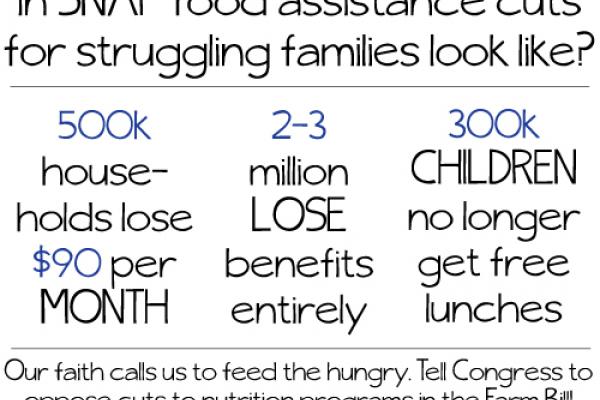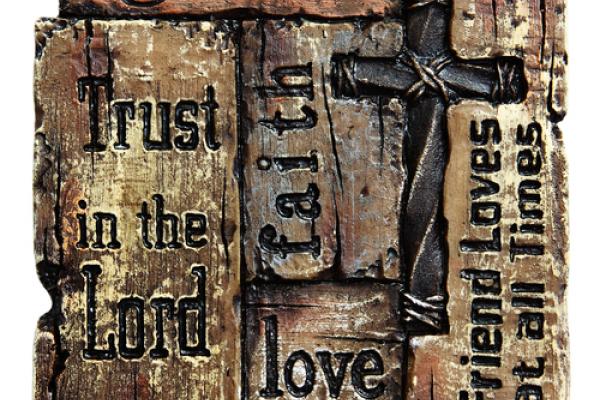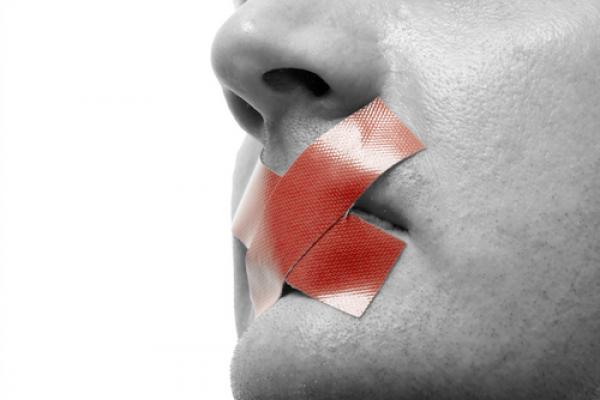Religion reporter Amy Sullivan has an interesting piece in The New Republic today on the politics surround the deep cuts to government food programs being proposed by the House Agriculture Committee.
As she notes:
"Some conservatives have argued that government shouldn’t even be in the business of feeding people—that the job should be handled by local congregations and other community organizations. Paul Ryan has sparred with Catholic bishops who oppose cuts to SNAP, quipping that 'a preferential option for the poor does not mean a preferential option for big government.'”
The article goes on to note that, while churches were the only social safety net the country had for many years, it was the Great Depression which ended this role. Quoting from an article by Alison Collis Greene:
“'The Depression crippled churches’ finances, and the economic downturn forced them to slash services when people needed help most. Religious leaders and local church members alike recognized the crisis, and many demanded that the federal government intervene.'”
Sullivan argues that we find ourselves in a situation not so different to that of the 1930s today:
"We are watching a similar situation play out now. Many religious traditions and individual churches were struggling when the recession began. The Catholic church was dealing with the fallout from the priest sex abuse scandals. It and other traditions are still embroiled in debates over homosexuality that have led to splits or caused members to leave altogether. Congregational membership levels are down in almost every religious tradition. And as a result, their resource pools have shrunk."
Yes, smarter and more effective government programs are vital when budgets are being cut across the board. But indiscriminate cuts to vital services like the Supplemental Nutrition Assistance Program (SNAP) and calls for churches to pick up the pieces are simply immoral and ultimately impossible.
The cuts being proposed by the Committee will have a devastating impact on poor Americans. It’s time to stand up for the poorest and more vulnerable. You can help. Tell Congress to oppose cuts to nutrition programs in the Farm Bill today.
This is the final in a four-part series on the overused (and often insensitively employed) phrases that plague the Christian lexicon. Though I felt like I was offering some insight into what to do instead of offering these cliches, some asked for more specificity or clarity. So in that spirit, I thought I’d offer a final list of things to do rather than pop off with these phrases that may mean little or nothing to the recipient, or worse, may cause unintended – but lasting – harm.
Read article one in the series here: Ten Cliches Christians Should Never Use
Read article two in the series here: Ten More Cliches Christians Should Avoid
Read article three in the series here: Nine (Final) Christian Cliches to Avoid
Now, Ten Antidotes to Christian Cliches.
Zeenia Framroze, a student at Harvard University, spoke in April at Georgetown University Berkley Center's Millennial Values Symposium. She speaks in this clip on how the Millennial generation faces its challenges for the future in light of diverse value systems.
"If we stop listening to each other, if we try to impose our values on another group, we lose the noteworthiness of our values itself. We need to have some faith in democracy and some faith in the marketplace of ideas and values," Framroze said. "We'll bicker and fight, but ultimately we'll have a far more worthwhile discussion."
 The Washington Post reports:
The Washington Post reports:
“The Pentagon is considering awarding a Distinguished Warfare Medal to drone pilots who work on military bases often far removed from the battlefield.”
If the medals are approved, that makes killing people from a computer in the U.S., thousands of miles from a combat zone, “distinguished warfare.” Will hazardous duty pay come next?
Every morning, Leo's smile brightens the cafeteria at my elementary school. He hobbles in, holding his teacher's hand. His eyes squint at the bright lights. He squirms at loud noises. And always, he smiles.
"Good morning, Leo," I say as I rub his cheek and look into his eyes. He looks back into my eyes for a split second, then gazes off into his own world. That one-second look is his way to say good morning. Leo is a non-verbal first-grader. He is a student in our K-2 trainable mentally disabled class. He comes to us with Down Syndrome, autism, and wonder.
One of the things that make America so great is the ability to express yourself, much to the joy, and even pain, of those around you. The freedom of speech is a two-edged sword and more often than not the one who wields it doesn’t fully grasp the power behind it.
Sadly there is no better example of poor usage of this freedom than when directed at the political arena. While late night talk show hosts have always taken shots at the President; now with social media outlets everyone has their two-cents to share … truth is most people would do well to learn the value of biting their tongue.
While I find great joy in the liberty found within the Freedom of Speech, I’ve come to realize that while it’s an American right it’s also much bigger than that … it’s a human right.
However, it’s not a Christian’s right.
With the Olympics just a few weeks away, Time reports on the fight that has broken out over security for the Games:
"Policing the world’s biggest peacetime logistics operation is a herculean task, and Britain’s intelligence and military officials are preparing for every eventuality — even if it means festooning a few apartment buildings with Rapier missiles.



